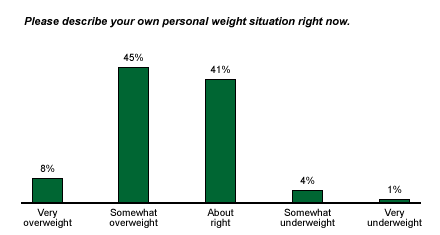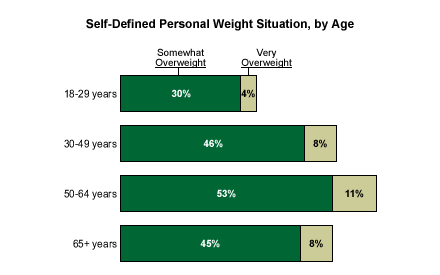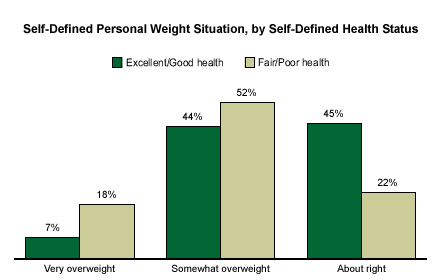The U.S. Centers for Disease Control and Prevention estimates 64% of Americans aged 20 and older are overweight, and 30% are obese. How do Americans' own perceptions of their weight compare with the CDC numbers?
A recent Gallup Poll Panel study* asked Americans to classify their personal weight situations. Slightly more than half (53%) of U.S. adults say they are overweight, with 45% describing themselves as "somewhat" overweight and only 8% admitting to being "very" overweight. Perceptions are at odds with reality, suggesting many Americans may be in denial about their weight problems -- or at least have a higher threshold for "overweight" than the clinical CDC definition.

Who's Overweight?
Americans' perceived weight situations vary by gender. Fifty-six percent of women, compared with 50% of men, say they are at least somewhat overweight. The percentage of women considering themselves very overweight accounts for the difference, 11% of women see themselves as this overweight, as do only 5% of men. Gender stereotypes undoubtedly play a role in these perceptions -- women may be more critical than men may be of their own weight status.
Weight perceptions also vary by age. Just 34% of 18- to 29-year-olds define themselves as overweight, compared with 54% of 30- to 49-year-olds, many of whom are likely beginning to suffer from the "middle-age spread," and 64% of 50- to 64-year-olds. The figure drops back to 53% among those aged 65 and older.

Weight Affects Personal Health
The specific negative health consequences of being overweight or obese may vary from person to person, and the medical community is currently debating the number of deaths that can be attributed to obesity each year. But there is certainly no question that carrying extra weight is not really good for your health.
Among Americans who rate their personal physical health as either "fair" or "poor," 52% say they are somewhat overweight and 18% say very overweight. Among those who say they are in "excellent" or "good" physical health, 44% say they are somewhat overweight and 7% say they are very overweight.

Bottom Line
Reducing the prevalence of obesity to less than 15% of Americans by 2010 is one of the CDC's main public health objectives. A large majority of Americans would like to work toward achieving that objective -- almost 7 in 10 (69%) say they want to lose weight.
How can the health community support and foster this desire to shed unwanted pounds? Medical professionals need to continue to work against the false perception that there is a "quick fix" for obesity -- and seek ways to improve Americans' self-discipline regarding the lifestyle changes that are the true long-term solution.
*These results are based on telephone interviews with a randomly selected national sample of 4,984 adults in the Gallup Poll Panel of households, aged 18 and older, conducted Nov. 16, 2004 to Jan. 5, 2005. For results based on this sample, one can say with 95% confidence that the maximum error attributable to sampling and other random effects is ±1.5 percentage points. In addition to sampling error, question wording and practical difficulties in conducting surveys can introduce error or bias into the findings of public opinion polls.
